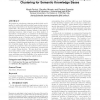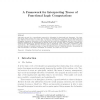529 search results - page 46 / 106 » Simple Random Logic Programs |
128
click to vote
ML
2006
ACM
15 years 2 months ago
2006
ACM
We propose a simple approach to combining first-order logic and probabilistic graphical models in a single representation. A Markov logic network (MLN) is a first-order knowledge b...
124
click to vote
CIKM
2007
Springer
15 years 8 months ago
2007
Springer
We present an evolutionary clustering method which can be applied to multi-relational knowledge bases storing resource annotations expressed in the standard languages for the Sema...
133
click to vote
ENTCS
2007
15 years 2 months ago
2007
This paper is part of a comprehensive approach to debugging for functional logic languages. The basic idea of the whole project is to trace the execution of functional logic progr...
122
click to vote
CEFP
2005
Springer
15 years 7 months ago
2005
Springer
This chapter describes Hume: a functionally-based language for programming with bounded resource usage, including time and space properties. The purpose of the Hume language design...
128
click to vote
SIGMOD
2004
ACM
15 years 7 months ago
2004
ACM
Information in today’s enterprises commonly resides in a variety of heterogeneous data sources, including relational databases, web services, files, packaged applications, and c...


